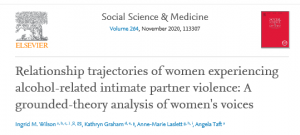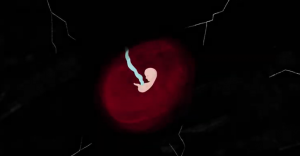Using a grounded theory approach the researchers analysed 18 in-depth interviews with women (who reported feeling afraid of their male partner when he had been drinking). Researchers identified key processes underpinning the women’s experiences and four relationships phases. These included Partner alcohol use played a key role in how women interpreted and dealt with IPV victimisation.
In early relationships, women spoke of not seeing or dismissing early warning signs of problem drinking and aggression in settings that normalized men’s heavy drinking. Later, women identified patterns of inter-connected drinking and aggression. This led to their questioning their reality while trying to ‘fix’ their partner’s drinking to stop the abuse. When change did not occur they learnt to manage daily life around the drinking and abuse. In the third phase, giving up hope that the partner would stop drinking, the women then ended the relationship. Finally, after leaving the abuser, women attempted to reset normal ideas around drinking behaviour but they reported continued trauma when exposed to drinking situations.
You can access the journal article here.


